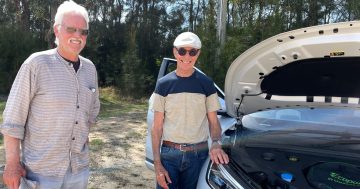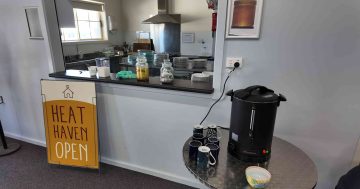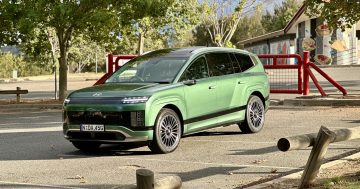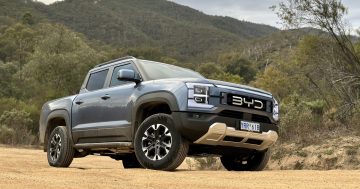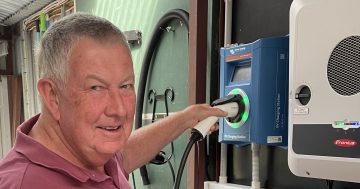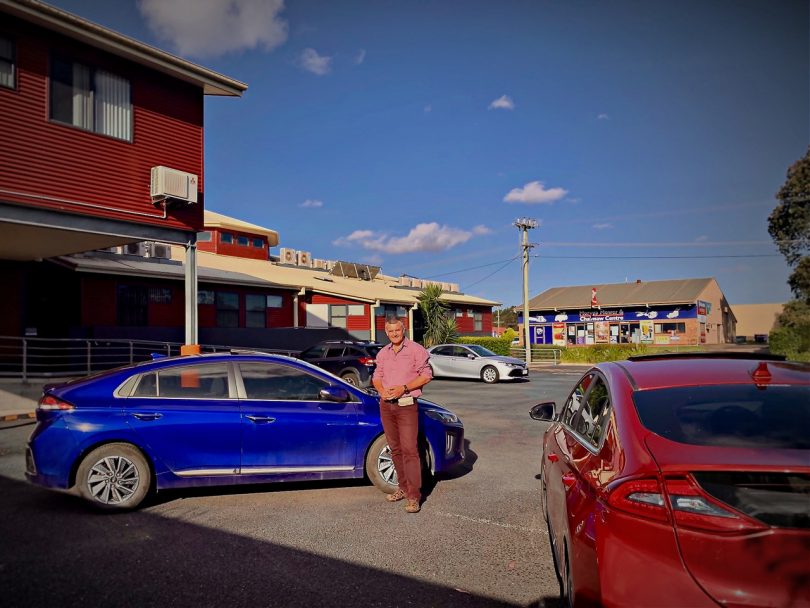
Dr Jorg Ziergiebel with his family electric vehicle and hybrid outside Moruya Medical Centre. Photo: Supplied.
For Moruya Medical Centre doctors, husband and wife team Dr Anke Dutschke and Dr Jorg Ziergiebel, health and wellbeing is top-of-mind. So powering two vehicles with solar energy leaves them with a sunny feeling.
Anke’s Hyundai IONIQ electric vehicle (EV) and Jorg’s Hyundai IONIQ hybrid vehicle charge via solar panels installed both at the doctors’ home and their Moruya surgery.
“With our set-up, we run the cars basically off the sun,” says Jorg. “We hardly ever charge while away – it’s only Anke’s fully electric car that needs a charge when going to Sydney.”
Electric vehicles hit the headlines recently when South Australia and Victoria moved forward with plans to introduce a new tax on EVs. NSW Treasurer Dominic Perrottet announced the state may soon follow, flagging his plan to put an electric car tax to cabinet.
The moves come despite Australia receiving criticism for its policy failure in reducing transport emissions, its lagging fuel standards and its inadequate progress in clean transport.
Many countries are forging ahead with their electric transport transition. In November 2020, the UK announced a ban on sales of new diesel and petrol cars by 2030. Japan is considering a similar timeframe for its transition.
For Anke and Jorg, the transition away from petrol cars makes sense on every level.
“We want to do our part for our children’s future, and installing solar and driving electric vehicles is something we could do,” says Anke.
“With less pollution from cars, there will be less airways disease, especially asthma and chronic obstructive pulmonary disease, which is very cost-intensive for patients. Long term, it means an immense reduction in health costs.”
Broad uptake of EVs will mean a reduction in many forms of pollution, the doctors say.
“It’s great to not wake up the neighbours when being called into the hospital in the middle of the night,” says Jorg. “And being a keen cyclist, I’m very much looking forward to not having to cycle through thick clouds of diesel fumes for much longer.”
The doctors have run their home and surgery on solar energy for several years. However, following the Black Summer bushfires and extended power disruptions, they added a battery to the surgery for increased resilience.
They say farewelling petrol cars means no compromise on comfort or convenience. And the cost savings are significant – they save around $1000 in fuel costs every quarter. Vehicle maintenance is infrequent and costs are minimal – around $200 per service for the EV. This means the extra cost of an electric vehicle – 25 per cent extra against a similar combustion engine vehicle – can be quickly recouped.
Jorg’s hybrid has a battery range of approximately 40km so he’s able to use it to commute to the surgery and charge from the surgery’s solar panels.
Anke charges her EV at home or at the surgery, and can reach Sydney by stopping at the fast-charging station at Berry Bowling Club.
Such a detour has residual benefits for regional towns, she says.
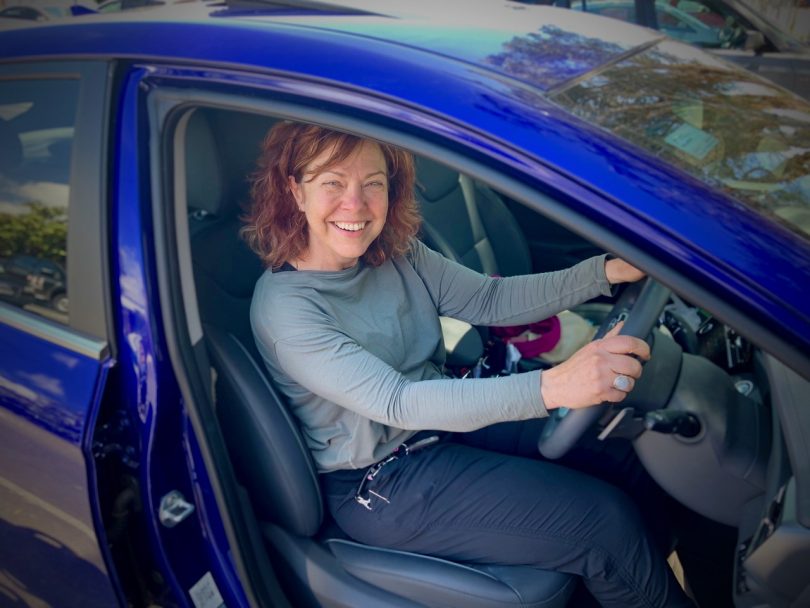
Dr Anke Dutschke is doing her bit for the environment by driving around Moruya in her electric vehicle.
“A charging station is a great way to draw tourists into the shops in a town, especially because many towns now have bypasses.”
The comfort, near-silence, skylight and luxury features are some of many EV drawcards, says Anke.
“I love my EV more than I’ve loved any other car,” she says. “I’d love to see more electric cars, but the [charging] infrastructure needs to be there.”
The Southcoast Health & Sustainability Alliance (SHASA) has recently formed an Electric Transport Committee and is working to increase awareness and uptake of electric and active transport in the Eurobodalla Shire. SHASA is currently working with businesses to install additional EV chargers in Moruya and Narooma.
SHASA president Kathryn Maxwell says increased use of EVs will have far-reaching health and economic benefits on an individual and community level.
“Wider use of EVs means reduced greenhouse gas emissions, less pollution, significant savings on fuel and maintenance costs, and reducing Australia’s dependence on foreign oil,” she says.
“The NSW Treasurer is saying we need to raise revenues from EVs, but the government is failing to do a robust cost/benefit analysis. They need to look at the bigger picture, including the health benefits of clean transport for Australian communities.
“EVs in Australia are currently cost prohibitive for many people and our state and federal governments should be making them more accessible, not less. Several European governments have recently boosted subsidies for EVs, stimulating demand and supporting a swift transition to electrified transport. Australia should be doing the same.”







